
Audio By Carbonatix
It's fair to say that posing for pictures comes with the territory of being a world leader.
The political photo-op is now something of a cliché, but one set of images caught the attention of social media earlier this week.
Pictures of North Korean leader Kim Jong-un on horseback spawned memes and parodies. But they also got us thinking - what makes for a good photo-op?
So, we've dug into the archives and put together this short guide. Aspiring politicians: take heed.
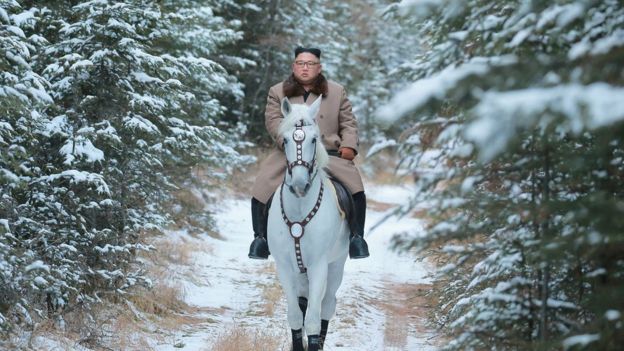 Image copyrightREUTERS
Image captionNorth Korean leader Kim Jong-un pictured travelling in typically understated fashion
What's going on here?
Fair question. That's Kim Jong-un riding a white horse through the snowy woods of the country's highest mountain.
A number of striking - and frankly poetic - images of Mr Kim on a chilly-looking Mount Paektu were released by state media earlier this week.
What can we learn from it?
That the setting of a photo-op really matters.
North Korea insists that Mt Paektu was the birthplace of Mr Kim's father and predecessor. In this sense, analysts view these images as a not-so-subtle reminder of Mr Kim's authority and power.
"These pictures are designed solely for domestic consumption," says long-time North Korea watcher Professor Hazel Smith. "They mimic pictures of his grandfather on a white horse and are meant to help provide legitimacy and authority to his rule."
Image copyrightREUTERS
Image captionNorth Korean leader Kim Jong-un pictured travelling in typically understated fashion
What's going on here?
Fair question. That's Kim Jong-un riding a white horse through the snowy woods of the country's highest mountain.
A number of striking - and frankly poetic - images of Mr Kim on a chilly-looking Mount Paektu were released by state media earlier this week.
What can we learn from it?
That the setting of a photo-op really matters.
North Korea insists that Mt Paektu was the birthplace of Mr Kim's father and predecessor. In this sense, analysts view these images as a not-so-subtle reminder of Mr Kim's authority and power.
"These pictures are designed solely for domestic consumption," says long-time North Korea watcher Professor Hazel Smith. "They mimic pictures of his grandfather on a white horse and are meant to help provide legitimacy and authority to his rule."
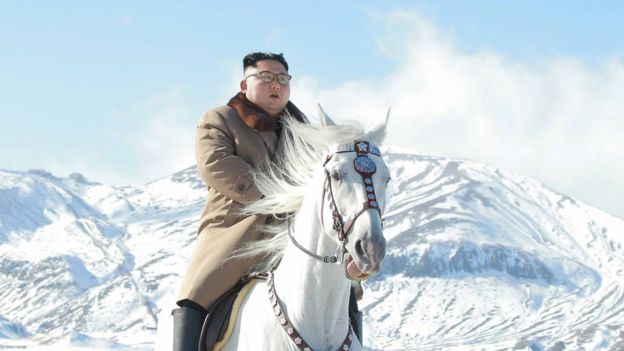 Image copyrightEPA
Image captionMt Paektu holds symbolic meaning in North Korean culture
But, experts say, they are fundamentally designed to emphasise Mr Kim's superiority.
"They give people the image that [he] is very different," says North Korea expert Dr Sojin Lim. "That he is not an ordinary human being - more like a God."
Image copyrightEPA
Image captionMt Paektu holds symbolic meaning in North Korean culture
But, experts say, they are fundamentally designed to emphasise Mr Kim's superiority.
"They give people the image that [he] is very different," says North Korea expert Dr Sojin Lim. "That he is not an ordinary human being - more like a God."
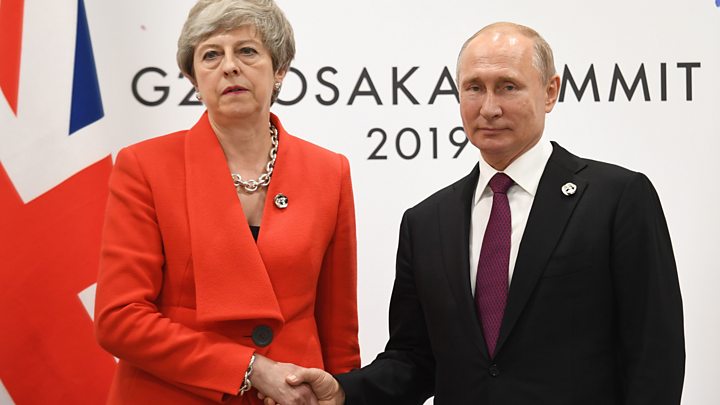 Media captionIt's fair to say there have been warmer political handshakes
What's going on here?
That's former UK Prime Minister Theresa May sharing a frosty handshake with Russian President Vladimir Putin earlier this year. Awkward.
What can we learn from it?
That body language, especially facial expressions, are key to a good photo-op.
And don't assume that the visible tension here is some kind of mistake. That can send a clear message too.
This particular meeting was the first between the two leaders since the poisoning of former Russian spy Sergei Skripal and his daughter Yulia in the UK. The UK blamed Russia, which denied any role in the attack.
So, tensions were high. It's fair to say this image made that abundantly clear.
Media captionIt's fair to say there have been warmer political handshakes
What's going on here?
That's former UK Prime Minister Theresa May sharing a frosty handshake with Russian President Vladimir Putin earlier this year. Awkward.
What can we learn from it?
That body language, especially facial expressions, are key to a good photo-op.
And don't assume that the visible tension here is some kind of mistake. That can send a clear message too.
This particular meeting was the first between the two leaders since the poisoning of former Russian spy Sergei Skripal and his daughter Yulia in the UK. The UK blamed Russia, which denied any role in the attack.
So, tensions were high. It's fair to say this image made that abundantly clear.
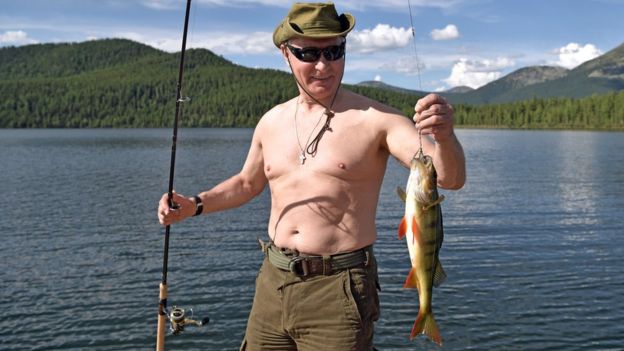 Image copyrightGETTY IMAGES
What's going on here?
It's Russian President Vladimir Putin enjoying some shirtless downtime in Siberia.
Mr Putin has become something of a photo-op legend, with images of him hunting, fishing, and exercising popping-up pretty regularly.
What can we learn from it?
That photo-ops are all about projecting an image. And Mr Putin has a carefully managed one.
"They are an essential part of how he perpetuates his political image," says Professor Kataryna Wolczuk, an expert in Russian politics. But why is he so often pictured doing outdoor activities?
"It's all about masculinity," Prof Wolczuk explains. "Russian men are expected to be strong, close to nature, and engaged in all sorts of daring pursuits. Putin uses these images to project himself as an action man."
"There's a cultural tradition here that power is for physically strong people," she adds.
Image copyrightGETTY IMAGES
What's going on here?
It's Russian President Vladimir Putin enjoying some shirtless downtime in Siberia.
Mr Putin has become something of a photo-op legend, with images of him hunting, fishing, and exercising popping-up pretty regularly.
What can we learn from it?
That photo-ops are all about projecting an image. And Mr Putin has a carefully managed one.
"They are an essential part of how he perpetuates his political image," says Professor Kataryna Wolczuk, an expert in Russian politics. But why is he so often pictured doing outdoor activities?
"It's all about masculinity," Prof Wolczuk explains. "Russian men are expected to be strong, close to nature, and engaged in all sorts of daring pursuits. Putin uses these images to project himself as an action man."
"There's a cultural tradition here that power is for physically strong people," she adds.
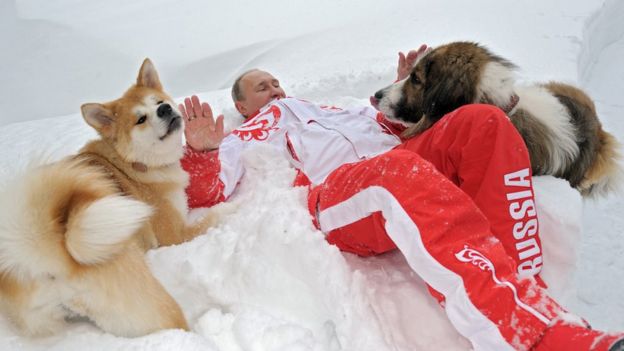 Image copyrightAFP
But it's not all guns and wrestling. "Putin, and other leaders, also take care to show they have a softer side. He tries to appear well-rounded," Prof Wolczuk says.
Hence the picture of him with the fluffy dogs.
Image copyrightAFP
But it's not all guns and wrestling. "Putin, and other leaders, also take care to show they have a softer side. He tries to appear well-rounded," Prof Wolczuk says.
Hence the picture of him with the fluffy dogs.
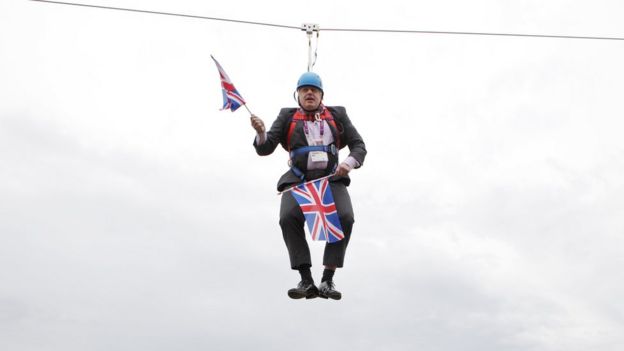 Image copyrightGETTY IMAGES
What's going on here?
That's current UK Prime Minister Boris Johnson stuck helplessly on a zip wire.
It happened in 2012 while he was still London mayor. It doesn't look any less uncomfortable today.
What can we learn from it?
That an apparent photo-op disaster can actually work out (relatively) well.
Almost immediately after Mr Johnson was pictured dangling from the wire, an array of memes and jokes about him spread online.
Image copyrightGETTY IMAGES
What's going on here?
That's current UK Prime Minister Boris Johnson stuck helplessly on a zip wire.
It happened in 2012 while he was still London mayor. It doesn't look any less uncomfortable today.
What can we learn from it?
That an apparent photo-op disaster can actually work out (relatively) well.
Almost immediately after Mr Johnson was pictured dangling from the wire, an array of memes and jokes about him spread online.
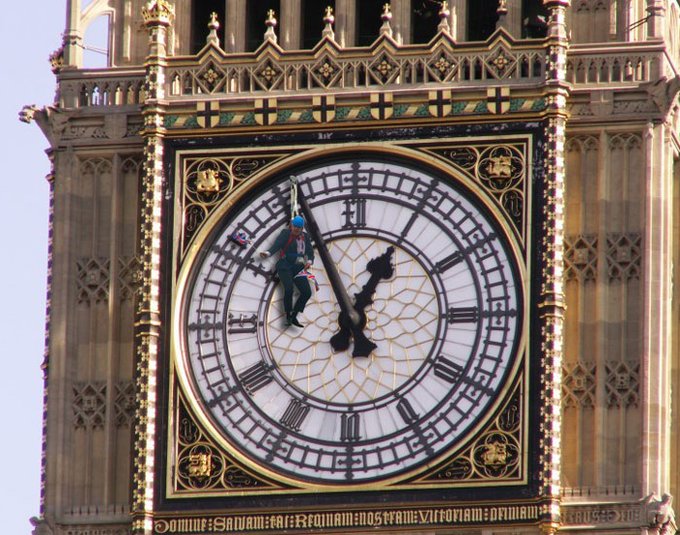 For most politicians this would spell disaster. But, as one witness told The Guardian earlier this year, "he seemed to take the buffoon and run with it".
Seven years later and he finds himself in Downing Street. Perhaps more aspiring prime ministers should consider a comical zip wire trip.
For most politicians this would spell disaster. But, as one witness told The Guardian earlier this year, "he seemed to take the buffoon and run with it".
Seven years later and he finds himself in Downing Street. Perhaps more aspiring prime ministers should consider a comical zip wire trip.
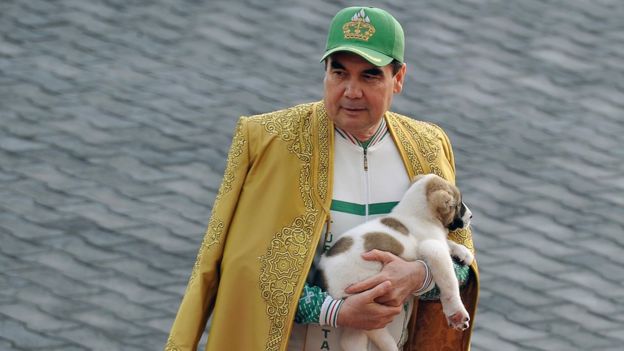 Image copyrightAFP
What's going on here?
That stylish man is Turkmenistan's President Gurbanguly Berdymukhamedov.
He's known for his strongman image (despite the puppy) and for his ostentatious PR stunts. He also wrote a rap song about horses and a book about tea drinking. Don't ask.
What can we learn from him?
That it's important to have photo-ops, at least occasionally, if you're a country's leader.
Why? Well, because otherwise people might assume that you've died.
Rumours of Mr Berdymukhamedov's death spread like wildfire earlier this year after he hadn't been seen in public for weeks.
State TV broadcast footage of the president riding a horse, driving a rally car and shooting targets on holiday in an attempt to dispel the rumours. But there was no evidence any of it was recent.
It wasn't until he was pictured at an event in a Caspian Sea resort town that rumours of his death were put to bed. Lesson learnt.
Image copyrightAFP
What's going on here?
That stylish man is Turkmenistan's President Gurbanguly Berdymukhamedov.
He's known for his strongman image (despite the puppy) and for his ostentatious PR stunts. He also wrote a rap song about horses and a book about tea drinking. Don't ask.
What can we learn from him?
That it's important to have photo-ops, at least occasionally, if you're a country's leader.
Why? Well, because otherwise people might assume that you've died.
Rumours of Mr Berdymukhamedov's death spread like wildfire earlier this year after he hadn't been seen in public for weeks.
State TV broadcast footage of the president riding a horse, driving a rally car and shooting targets on holiday in an attempt to dispel the rumours. But there was no evidence any of it was recent.
It wasn't until he was pictured at an event in a Caspian Sea resort town that rumours of his death were put to bed. Lesson learnt.
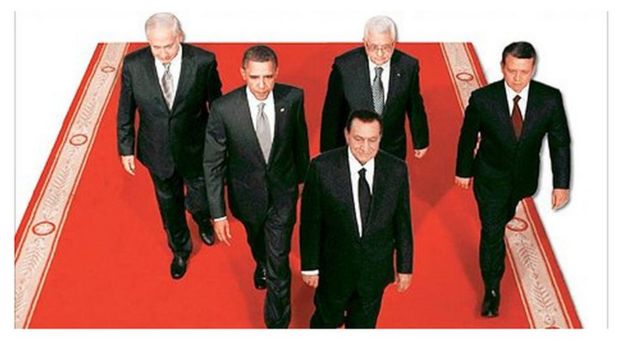 Image copyrightAL-AHRAM
What's going on here?
That grainy image (it's from a newspaper) shows Egypt's then-President Hosni Mubarak leading former US President Barack Obama and other world leaders along a red carpet in 2010.
It was taken at the White House shortly after Middle East peace talks were re-launched. Straightforward enough, right?
What can we learn from it?
That when it comes to photo-ops things are not always as they seem.
Here's the original image - spot the difference:
Image copyrightAL-AHRAM
What's going on here?
That grainy image (it's from a newspaper) shows Egypt's then-President Hosni Mubarak leading former US President Barack Obama and other world leaders along a red carpet in 2010.
It was taken at the White House shortly after Middle East peace talks were re-launched. Straightforward enough, right?
What can we learn from it?
That when it comes to photo-ops things are not always as they seem.
Here's the original image - spot the difference:
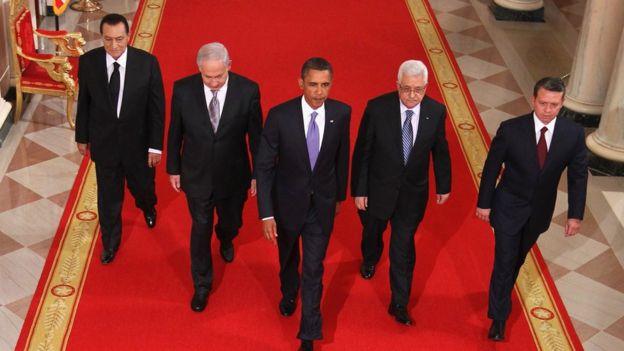 Image copyrightGETTY IMAGES
As you can see, in the actual image Mr Obama leads the way and Mr Mubarak trails behind.
To be fair to Mr Mubarak, it was Egypt's state-run newspaper rather than his office that altered the image. But it still proved to be embarrassing.
Image copyrightGETTY IMAGES
As you can see, in the actual image Mr Obama leads the way and Mr Mubarak trails behind.
To be fair to Mr Mubarak, it was Egypt's state-run newspaper rather than his office that altered the image. But it still proved to be embarrassing.
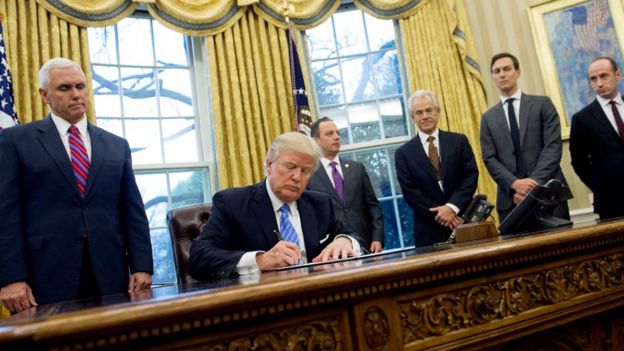 Image copyrightGETTY IMAGES
What's going on here?
This historic image was taken on US President Donald Trump's first day in the Oval Office. (It was the 23rd January 2017, for the record).
It shows him signing an abortion-related order. He's surrounded by various top White House figures, including Vice-President Mike Pence on the left.
What can we learn from it?
That the people in the background matter.
This fairly standard photo-op garnered a significant backlash. Column inches, Twitter threads and TV airtime were all dedicated to the reaction.
Why was the response so fierce? Because, as critics of the order were quick to point out, there are no women in the picture.
"All of these people seem eminently qualified to determine WOMEN'S health care. Not," one Twitter user said at the time. "Notice anyone missing?" another asked.
But one person's questionable photo-op can be another's opportunity. So, right on cue, Sweden's deputy prime minister responded with what many felt was a mocking parody.
Image copyrightGETTY IMAGES
What's going on here?
This historic image was taken on US President Donald Trump's first day in the Oval Office. (It was the 23rd January 2017, for the record).
It shows him signing an abortion-related order. He's surrounded by various top White House figures, including Vice-President Mike Pence on the left.
What can we learn from it?
That the people in the background matter.
This fairly standard photo-op garnered a significant backlash. Column inches, Twitter threads and TV airtime were all dedicated to the reaction.
Why was the response so fierce? Because, as critics of the order were quick to point out, there are no women in the picture.
"All of these people seem eminently qualified to determine WOMEN'S health care. Not," one Twitter user said at the time. "Notice anyone missing?" another asked.
But one person's questionable photo-op can be another's opportunity. So, right on cue, Sweden's deputy prime minister responded with what many felt was a mocking parody.
Do: Think carefully about the setting
 Image copyrightREUTERS
Image captionNorth Korean leader Kim Jong-un pictured travelling in typically understated fashion
What's going on here?
Fair question. That's Kim Jong-un riding a white horse through the snowy woods of the country's highest mountain.
A number of striking - and frankly poetic - images of Mr Kim on a chilly-looking Mount Paektu were released by state media earlier this week.
What can we learn from it?
That the setting of a photo-op really matters.
North Korea insists that Mt Paektu was the birthplace of Mr Kim's father and predecessor. In this sense, analysts view these images as a not-so-subtle reminder of Mr Kim's authority and power.
"These pictures are designed solely for domestic consumption," says long-time North Korea watcher Professor Hazel Smith. "They mimic pictures of his grandfather on a white horse and are meant to help provide legitimacy and authority to his rule."
Image copyrightREUTERS
Image captionNorth Korean leader Kim Jong-un pictured travelling in typically understated fashion
What's going on here?
Fair question. That's Kim Jong-un riding a white horse through the snowy woods of the country's highest mountain.
A number of striking - and frankly poetic - images of Mr Kim on a chilly-looking Mount Paektu were released by state media earlier this week.
What can we learn from it?
That the setting of a photo-op really matters.
North Korea insists that Mt Paektu was the birthplace of Mr Kim's father and predecessor. In this sense, analysts view these images as a not-so-subtle reminder of Mr Kim's authority and power.
"These pictures are designed solely for domestic consumption," says long-time North Korea watcher Professor Hazel Smith. "They mimic pictures of his grandfather on a white horse and are meant to help provide legitimacy and authority to his rule."
 Image copyrightEPA
Image captionMt Paektu holds symbolic meaning in North Korean culture
But, experts say, they are fundamentally designed to emphasise Mr Kim's superiority.
"They give people the image that [he] is very different," says North Korea expert Dr Sojin Lim. "That he is not an ordinary human being - more like a God."
Image copyrightEPA
Image captionMt Paektu holds symbolic meaning in North Korean culture
But, experts say, they are fundamentally designed to emphasise Mr Kim's superiority.
"They give people the image that [he] is very different," says North Korea expert Dr Sojin Lim. "That he is not an ordinary human being - more like a God."
Don't: Forget about body language
 Media captionIt's fair to say there have been warmer political handshakes
What's going on here?
That's former UK Prime Minister Theresa May sharing a frosty handshake with Russian President Vladimir Putin earlier this year. Awkward.
What can we learn from it?
That body language, especially facial expressions, are key to a good photo-op.
And don't assume that the visible tension here is some kind of mistake. That can send a clear message too.
This particular meeting was the first between the two leaders since the poisoning of former Russian spy Sergei Skripal and his daughter Yulia in the UK. The UK blamed Russia, which denied any role in the attack.
So, tensions were high. It's fair to say this image made that abundantly clear.
Media captionIt's fair to say there have been warmer political handshakes
What's going on here?
That's former UK Prime Minister Theresa May sharing a frosty handshake with Russian President Vladimir Putin earlier this year. Awkward.
What can we learn from it?
That body language, especially facial expressions, are key to a good photo-op.
And don't assume that the visible tension here is some kind of mistake. That can send a clear message too.
This particular meeting was the first between the two leaders since the poisoning of former Russian spy Sergei Skripal and his daughter Yulia in the UK. The UK blamed Russia, which denied any role in the attack.
So, tensions were high. It's fair to say this image made that abundantly clear.
Do: Show off your interests
 Image copyrightGETTY IMAGES
What's going on here?
It's Russian President Vladimir Putin enjoying some shirtless downtime in Siberia.
Mr Putin has become something of a photo-op legend, with images of him hunting, fishing, and exercising popping-up pretty regularly.
What can we learn from it?
That photo-ops are all about projecting an image. And Mr Putin has a carefully managed one.
"They are an essential part of how he perpetuates his political image," says Professor Kataryna Wolczuk, an expert in Russian politics. But why is he so often pictured doing outdoor activities?
"It's all about masculinity," Prof Wolczuk explains. "Russian men are expected to be strong, close to nature, and engaged in all sorts of daring pursuits. Putin uses these images to project himself as an action man."
"There's a cultural tradition here that power is for physically strong people," she adds.
Image copyrightGETTY IMAGES
What's going on here?
It's Russian President Vladimir Putin enjoying some shirtless downtime in Siberia.
Mr Putin has become something of a photo-op legend, with images of him hunting, fishing, and exercising popping-up pretty regularly.
What can we learn from it?
That photo-ops are all about projecting an image. And Mr Putin has a carefully managed one.
"They are an essential part of how he perpetuates his political image," says Professor Kataryna Wolczuk, an expert in Russian politics. But why is he so often pictured doing outdoor activities?
"It's all about masculinity," Prof Wolczuk explains. "Russian men are expected to be strong, close to nature, and engaged in all sorts of daring pursuits. Putin uses these images to project himself as an action man."
"There's a cultural tradition here that power is for physically strong people," she adds.
 Image copyrightAFP
But it's not all guns and wrestling. "Putin, and other leaders, also take care to show they have a softer side. He tries to appear well-rounded," Prof Wolczuk says.
Hence the picture of him with the fluffy dogs.
Image copyrightAFP
But it's not all guns and wrestling. "Putin, and other leaders, also take care to show they have a softer side. He tries to appear well-rounded," Prof Wolczuk says.
Hence the picture of him with the fluffy dogs.
Don't: Fear looking ridiculous
 Image copyrightGETTY IMAGES
What's going on here?
That's current UK Prime Minister Boris Johnson stuck helplessly on a zip wire.
It happened in 2012 while he was still London mayor. It doesn't look any less uncomfortable today.
What can we learn from it?
That an apparent photo-op disaster can actually work out (relatively) well.
Almost immediately after Mr Johnson was pictured dangling from the wire, an array of memes and jokes about him spread online.
Image copyrightGETTY IMAGES
What's going on here?
That's current UK Prime Minister Boris Johnson stuck helplessly on a zip wire.
It happened in 2012 while he was still London mayor. It doesn't look any less uncomfortable today.
What can we learn from it?
That an apparent photo-op disaster can actually work out (relatively) well.
Almost immediately after Mr Johnson was pictured dangling from the wire, an array of memes and jokes about him spread online.
 For most politicians this would spell disaster. But, as one witness told The Guardian earlier this year, "he seemed to take the buffoon and run with it".
Seven years later and he finds himself in Downing Street. Perhaps more aspiring prime ministers should consider a comical zip wire trip.
For most politicians this would spell disaster. But, as one witness told The Guardian earlier this year, "he seemed to take the buffoon and run with it".
Seven years later and he finds himself in Downing Street. Perhaps more aspiring prime ministers should consider a comical zip wire trip.
Do: Get pictured regularly
 Image copyrightAFP
What's going on here?
That stylish man is Turkmenistan's President Gurbanguly Berdymukhamedov.
He's known for his strongman image (despite the puppy) and for his ostentatious PR stunts. He also wrote a rap song about horses and a book about tea drinking. Don't ask.
What can we learn from him?
That it's important to have photo-ops, at least occasionally, if you're a country's leader.
Why? Well, because otherwise people might assume that you've died.
Rumours of Mr Berdymukhamedov's death spread like wildfire earlier this year after he hadn't been seen in public for weeks.
State TV broadcast footage of the president riding a horse, driving a rally car and shooting targets on holiday in an attempt to dispel the rumours. But there was no evidence any of it was recent.
It wasn't until he was pictured at an event in a Caspian Sea resort town that rumours of his death were put to bed. Lesson learnt.
Image copyrightAFP
What's going on here?
That stylish man is Turkmenistan's President Gurbanguly Berdymukhamedov.
He's known for his strongman image (despite the puppy) and for his ostentatious PR stunts. He also wrote a rap song about horses and a book about tea drinking. Don't ask.
What can we learn from him?
That it's important to have photo-ops, at least occasionally, if you're a country's leader.
Why? Well, because otherwise people might assume that you've died.
Rumours of Mr Berdymukhamedov's death spread like wildfire earlier this year after he hadn't been seen in public for weeks.
State TV broadcast footage of the president riding a horse, driving a rally car and shooting targets on holiday in an attempt to dispel the rumours. But there was no evidence any of it was recent.
It wasn't until he was pictured at an event in a Caspian Sea resort town that rumours of his death were put to bed. Lesson learnt.
Don't: Get caught editing
 Image copyrightAL-AHRAM
What's going on here?
That grainy image (it's from a newspaper) shows Egypt's then-President Hosni Mubarak leading former US President Barack Obama and other world leaders along a red carpet in 2010.
It was taken at the White House shortly after Middle East peace talks were re-launched. Straightforward enough, right?
What can we learn from it?
That when it comes to photo-ops things are not always as they seem.
Here's the original image - spot the difference:
Image copyrightAL-AHRAM
What's going on here?
That grainy image (it's from a newspaper) shows Egypt's then-President Hosni Mubarak leading former US President Barack Obama and other world leaders along a red carpet in 2010.
It was taken at the White House shortly after Middle East peace talks were re-launched. Straightforward enough, right?
What can we learn from it?
That when it comes to photo-ops things are not always as they seem.
Here's the original image - spot the difference:
 Image copyrightGETTY IMAGES
As you can see, in the actual image Mr Obama leads the way and Mr Mubarak trails behind.
To be fair to Mr Mubarak, it was Egypt's state-run newspaper rather than his office that altered the image. But it still proved to be embarrassing.
Image copyrightGETTY IMAGES
As you can see, in the actual image Mr Obama leads the way and Mr Mubarak trails behind.
To be fair to Mr Mubarak, it was Egypt's state-run newspaper rather than his office that altered the image. But it still proved to be embarrassing.
Do: Consider the optics
 Image copyrightGETTY IMAGES
What's going on here?
This historic image was taken on US President Donald Trump's first day in the Oval Office. (It was the 23rd January 2017, for the record).
It shows him signing an abortion-related order. He's surrounded by various top White House figures, including Vice-President Mike Pence on the left.
What can we learn from it?
That the people in the background matter.
This fairly standard photo-op garnered a significant backlash. Column inches, Twitter threads and TV airtime were all dedicated to the reaction.
Why was the response so fierce? Because, as critics of the order were quick to point out, there are no women in the picture.
"All of these people seem eminently qualified to determine WOMEN'S health care. Not," one Twitter user said at the time. "Notice anyone missing?" another asked.
But one person's questionable photo-op can be another's opportunity. So, right on cue, Sweden's deputy prime minister responded with what many felt was a mocking parody.
Image copyrightGETTY IMAGES
What's going on here?
This historic image was taken on US President Donald Trump's first day in the Oval Office. (It was the 23rd January 2017, for the record).
It shows him signing an abortion-related order. He's surrounded by various top White House figures, including Vice-President Mike Pence on the left.
What can we learn from it?
That the people in the background matter.
This fairly standard photo-op garnered a significant backlash. Column inches, Twitter threads and TV airtime were all dedicated to the reaction.
Why was the response so fierce? Because, as critics of the order were quick to point out, there are no women in the picture.
"All of these people seem eminently qualified to determine WOMEN'S health care. Not," one Twitter user said at the time. "Notice anyone missing?" another asked.
But one person's questionable photo-op can be another's opportunity. So, right on cue, Sweden's deputy prime minister responded with what many felt was a mocking parody.DISCLAIMER: The Views, Comments, Opinions, Contributions and Statements made by Readers and Contributors on this platform do not necessarily represent the views or policy of Multimedia Group Limited.
DISCLAIMER: The Views, Comments, Opinions, Contributions and Statements made by Readers and Contributors on this platform do not necessarily represent the views or policy of Multimedia Group Limited.
Latest Stories
-
Ghana’s global image boosted by our world-acclaimed reset agenda – Mahama
9 minutes -
Full text: Mahama’s New Year message to the nation
10 minutes -
The foundation is laid; now we accelerate and expand in 2026 – Mahama
29 minutes -
There is no NPP, CPP nor NDC Ghana, only one Ghana – Mahama
31 minutes -
Eduwatch praises education financing gains but warns delays, teacher gaps could derail reforms
45 minutes -
Kusaal Wikimedians take local language online in 14-day digital campaign
2 hours -
Stop interfering in each other’s roles – Bole-Bamboi MP appeals to traditional rulers for peace
2 hours -
Playback: President Mahama addressed the nation in New Year message
2 hours -
Industrial and Commercial Workers’ Union call for strong work ethics, economic participation in 2026 new year message
4 hours -
Crossover Joy: Churches in Ghana welcome 2026 with fire and faith
4 hours -
Traffic chaos on Accra–Kumasi Highway leaves hundreds stranded as diversions gridlock
4 hours -
Luv FM Family Party in the Park: Hundreds of families flock to Luv FM family party as more join the queue in excitement
5 hours -
Failure to resolve galamsey menace could send gov’t to opposition – Dr Asah-Asante warns
5 hours -
Leadership Lunch & Learn December edition empowers women leaders with practical insights
5 hours -
12 of the best TV shows to watch this January
5 hours

